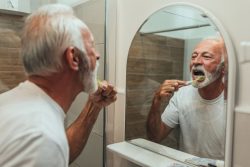Cleaning Your Oral Appliance: 5 Practical Tips
November 17, 2021
For most people, oral hygiene involves brushing, flossing, rinsing, and drinking plenty of water. If you use an oral appliance to treat your sleep apnea, however, your oral hygiene routine must include a few extra steps. Keeping your appliance clean can protect your mouth and help your device to stand the test of time. In this blog post, we will discuss practical tips for maintaining and cleaning your oral appliance.
1. Brush Your Teeth Every Night
Admittedly, it can be a challenge to maintain a routine of brushing your teeth at night, especially if you are exhausted after a long day. However, it is important that you do so. If you do not brush, all of the plaque and food particles from the day will remain on your teeth overnight—and your oral appliance will trap them in place. Not only will this contaminate your appliance, but you may also put yourself at an increased risk of cavities and gum disease.
2. Rinse Your Appliance Before Wearing It
Even if your appliance has been stored in its case all day, it’s a good idea to quickly rinse and dry it before you begin to wear it each night. Doing so will help to get rid of any particles that might be clinging to it.
3. Clean Your Appliance Every Morning
Just like you brush your teeth every morning, you should also clean your oral appliance daily. Here are a few tips for an effective cleaning routine:
- Do not use abrasive cleaning agents. Abrasive substances, including many types of toothpaste, can scratch your appliance. Bacteria can collect in those little scratches and contribute to unpleasant odors and tastes. Instead, use a solution that is specifically meant for oral appliances or even a sonic wave cleaner. There are many on the market that you can find locally or online.
- Do not use boiling water. Yes, boiling water can kill bacteria, but its high temperature may also warp your appliance. Warm water is a safer choice.
- Do not use bleach. While bleach is an effective cleaning agent, it can damage your oral appliance.
4. Store It When It Is Dry
After you clean your appliance, you can place it in its storage case—but don’t close the case right away. Allowing it to get some air will make sure it is completely dry, which will reduce bacterial growth.
5. Soak It Once a Week
To deep clean your oral appliance, place it in a glass of water with a denture-cleaning tablet about once a week. This will help to clean all the appliance’s nooks and crannies so it stays as fresh and functional as possible.
Your oral appliance is your best friend in your fight against sleep apnea. Keeping it clean will ensure that it continues to serve you well for as long as possible.
Meet Dr. Mogell
Dr. Kenneth Mogell is a dental sleep medicine expert who specializes in helping patients conquer sleep apnea via oral appliance therapy. He has decades of experience and has gained a reputation for being a leader in his field. To learn more about him and how he may be able to help you start getting the sleep you need, contact our office at 321-265-3462. We accept Medicare, Tricare and most medical insurance!
